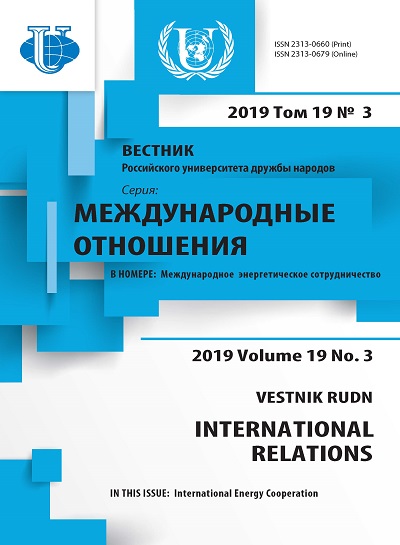War on Terrorism in Pakistan: Challenges and Strategic Steps
- Authors: Malik Z.U.1, He Z.1, Rafay M.2
-
Affiliations:
- School of History and Civilization, Shaanxi Normal University
- University of Sargodha
- Issue: Vol 19, No 4 (2019): Islamic Factor in World Politics
- Pages: 625-631
- Section: PEACE AND SECURITY
- URL: https://journals.rudn.ru/international-relations/article/view/22841
- DOI: https://doi.org/10.22363/2313-0660-2019-19-4-625-631
- ID: 22841
Cite item
Full Text
Abstract
The incident of 9/11 is said to be a watershed event in the history of international relations. After this ferocious incident Pakistan was forced to join the Global War on Terrorism in September 2001 and since then it has faced a lot of challenges. After joining this war, the security situation has become worse within few years, and military forces had to start several operations to fight and eliminate the menace of terrorism. The War on Terror (WOT) has greatly affected the economic growth, political and social situation of the country. This paper discusses the reasons behind the terrorism, the ways it has affected the national security, education and economy, and the steps for its elimination. The general conclusion made by the author is that Pakistan like other countries cannot cure this menace alone by the use of force. The government should adopt a complex and wide strategy focusing in priority on the factors that are responsible for igniting terrorism, and by solving the problems being faced by the poor masses of the country.
Keywords
About the authors
Zain Ul Abiden Malik
School of History and Civilization, Shaanxi Normal University
Author for correspondence.
Email: zainulabiden@snnu.edu.cn
PhD Scholar
Shaanxi, Xi’an, ChinaZhilong He
School of History and Civilization, Shaanxi Normal University
Email: zainulabiden@snnu.edu.cn
Professor
Shaanxi, Xi’an, ChinaMubeen Rafay
University of Sargodha
Email: zainulabiden@snnu.edu.cn
Masters in International Relations
Punjab, PakistanReferences
- Afridi, M.K., Yousufi, M. & Khan, M. (2014). Military Operation as a Response to Terrorism : A Case Study of Malakand Division Pakistan. Mediterranean Journal of Social Science, 5 (20), 2000-2006
- Afzal, S., Iqbal, H. & Inayay, M. (2012). Terrorism and Extremism as a Non-Traditional Security Threat Post 9/11: Implications for Pakistan’s Security. International Journal of Business and Social Science, 3 (24), 194-203
- Ahmar, M. (2007). Sectarian Conflicts in Pakistan. Pakistan Vision, 9 (1), 1-19
- Ali, G. & Li, Z. (2016). Role of Economic Factors in Terrorism in Pakistan. Quality & Quantity, 50 (5), 2237-2250. doi: 10.1007/s11135-015-0260-7
- Anwar, M.A. & Rafique, Z. (2012). Defense Spending and National Security of Pakistan : A Policy Perspective. Democracy and Security, 8 (4), 374-399. doi: 10.1080/17419166.2012.739551
- Chishti, N.A. (2014). Pakistan’s National Security: An Analytical Study. Journal of Asian Developmental Studies, 3 (3), 94-98.
- Fair, C.C. (2012). Pakistan in 2011: Ten Years of the War on Terror. Asian Survey, 52 (1), 100-113.
- Fair, C.C. (2015). Explaining Support for Sectarian Terrorism in Pakistan: Piety, Maslak and Sharia. Religions, 6 (4), 1137-1167.
- Gul, T.G., Hussain, A.H., Bangash, S.B. & Khattak, S.W. (2010). Impact of Terrorism on Financial Markets of Pakistan. European Journal of Social Sciences, 18 (1), 98-108.
- Hoffman, B. (2017). Rethinking Terrorism and Counterterrorism Since 9/11. Journal of Studies in Conflict & Terrorism, 25 (5), 303-316.
- Hyder, S., Akram, N. & Padda, I.U.H. (2015). Impact of Terrorism on Economic Development in Pakistan. Pakistan Business Review, 1 (1), 704-722.
- Global Terrorism Index. (2018). Global Terrorism Index 2018: Measuring and Understanding the Impact of Terrorism. Institute for Economics & Peace.
- Javaid, U. & Haq, M.A.U. (2016). Political Challenges and Security Issues in FATA and Its Impact on Economic Development. A Research Journal of South Asian Studies, 31 (1), 367-380.
- Khan, H. (2013). Pakistan’s Contribution to Global War On Terror After 9/11. IPRI, XIII (1), 37-56.
- Khan, I.A. (2018). Understanding Pakistan’s Pro-Taliban Afghan Policy. Pakistan Horizon, 60 (2), 141-157.
- Malik, S. (2009). Security Sector Reforms in Pakistan: Challenges and Future Prospects. South Asian Survey, 16 (2), 273-289. doi: 10.1177/097152310901600207
- Malik, Z.U.A. & He Zhilong. (2018). Present Scenario of Central Asia with Respect to Pakistan and Afghanistan in the Light of Security Challenges. International Journal of Political Science, 4 (1-4). doi: 10.20431/2454-9452.0403001
- Musharraf, P. (2006). In the Line of Fire: A Memoir. Free Press
- Rabbi, F. (2012). War against Terrorism and its Repercussions for Pakistan. Pakistan Journal of History and Culture, XXXIII (2), 72-90
- Sahill, P.H. (2017). The Terror Speaks: Inside Pakistan’s Terrorism Discourse and National Action Plan. Studies in Conflict & Terrorism, 41 (4), 319-337. doi: 10.1080/1057610x.2017.1284448
- Shah, S.A.A. & Ayaz. (2015). International Security Assistance Force Drawdown from Afghanistan: Challenges and Opportunities. FWU Journal of Social Sciences, 9 (1), 1-8
- Syed, F.Z. & Javed, S. (2017). Deterrence : A Security Strategy against Non Traditional Security Threats to Pakistan. International Journal of Social Sciences and Management, 4 (4), 267-274
- Syed, S.H., Saeed, L. & Martin, R.P. (2015). Causes and Incentives for Terrorism in Pakistan. Journal of Applied Security Research, 10 (2), 181-206
- Zeb, R. (2006). Cross Border Terrorism Issues Plaguing Pakistan - Afghanistan Relations. China and Eurasia Forum Quarterly, 4 (2), 69-74
Supplementary files










